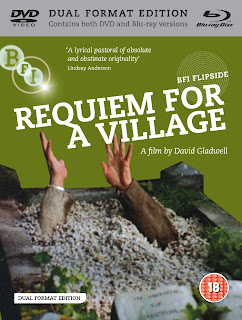Posted by Frank Collins
on Sunday, 17 July 2011
·
David Gladwell is not a name you'll instantly recognise from the annals of British film and television. Hopefully this is going to be rectified with the release of
Requiem for a Village (1975), one of only two features he made during his long career as a British film maker. Start digging and you'll soon discover that Gladwell's reputation spans much of the British documentary movement of the 1950s and 1960s, either as a director or as an editor.
He studied painting at Gloucester Art College, began experimenting with film, and by 1958 had made two short films,
A Summer Discord (1955) and
Miss Thompson Goes Shopping (1958) with funding from the BFI. Both films are included in the supplements to this disc and demonstrate his fascination with the plasticity of the medium, a striking blend of jump cuts, slow motion, non-diegetic sound, unorthodox framing, use of close-ups and mixing black and white with colour footage. The success of these films secured Gladwell further support from the BFI and led to the fractured time experiments of
An Untitled Film (1964). This haunting film synthesised Gladwell's obsession with time, where the components of a brief event are broken down into a slow motion catalogue of gestures, actions, looks and emotions. He also worked at British Transport Films in the 1960s, editing a number of short features, and began a productive partnership with Derrick Knight and Partners, a documentary film production company, that saw him direct and edit a number of films, including
The Great Steam Fair (1964), also included in this set, and a promotional film for the new town of Harlow,
Faces of Harlow (1964) commissioned by the Harlow Development Corporation.
Later in the 1960s, he worked as an editor on major feature films such as Lindsay Anderson's
If... (1968) and
O, Lucky Man! (1973), the Merchant Ivory production
Bombay Talkie (1970) and worked as an editor on John Berger's acclaimed BBC series,
Ways of Seeing (1972). After writing, directing, producing and editing
Requiem for a Village, he continued working on a number of documentary films for the BBC and Channel 4 but he only wrote and directed one other feature film, an adaptation of Doris Lessing's
Memoirs of a Survivor (1981) starring Julie Christie. It's themes, the ability to see or visit the past from the standpoint of a present on the brink of chaos and destructive change, resonate with Gladwell's own ideas in
Requiem.
 Went the Day Well? (1942) was Brazilian born director Alberto Cavalcanti's first feature film for Ealing Studios after he had joined them, in 1940, from the GPO and Crown Film Unit, then under the auspices of documentarian John Grierson. Under Grierson's wing, Cavalcanti had contributed to a number of highly-regarded British documentary films such as Coal Face (1935), Night Mail (1936) and Spare Time (1939). When Grierson left for Canada he was offered the post of head of the unit but declined when it required him to become a naturalised British citizen.
Went the Day Well? (1942) was Brazilian born director Alberto Cavalcanti's first feature film for Ealing Studios after he had joined them, in 1940, from the GPO and Crown Film Unit, then under the auspices of documentarian John Grierson. Under Grierson's wing, Cavalcanti had contributed to a number of highly-regarded British documentary films such as Coal Face (1935), Night Mail (1936) and Spare Time (1939). When Grierson left for Canada he was offered the post of head of the unit but declined when it required him to become a naturalised British citizen. 















